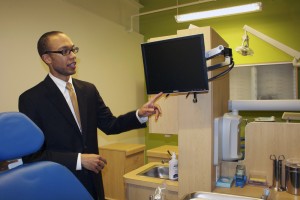New Dental Clinic Bolsters Access for D.C.’s Low-Income Patients

Elahe Izadi / DCentric
Dentist Steven Myles shows how he is able to access a patient's medical records during appointments in Bread for the City's new dental clinic.
It’s been more than a decade since Florence Sandridge has been to a dentist. Now, the 80-year-old needs a plate put in her mouth.
“Usually the dentist is so expensive,” she said. That’s why last week she went to the ribbon-cutting of a free dental clinic for low-income D.C. residents.
The Bread for the City single-room clinic — with its green walls, new equipment and a couple of dentist chairs — fills a big gap. There are few options for low-income D.C. residents. Those on Medicare, Medicaid or signed up with D.C. Health Alliance receive some dental coverage. There are also a few other free dental clinics in the city — such as one run by nonprofit So Others Might Eat — and a mobile dental clinic that makes stops throughout the city. “But there just aren’t enough services,” said Kristin Valentine, Bread for the City’s development director. Dental care is consistently the most requested service among the Bread for the City’s clients.
Even those with dental coverage don’t regularly see a dentist; about half of low-income adults with coverage haven’t been to the dentist in at least a year, according to a Kaiser Family Foundation report. The reasons vary. Some have problems finding dentists who accept Medicaid. Out-of-pocket costs for those under private and public plans may be too expensive for families. Other issues keep low-income adults from getting dental care, such as lack of transportation, child care and work arrangements and cultural barriers, according to the Kaiser report.
Joan Carson, 56, is a Bread for the City client who serves on the nonprofit’s advisory board. She said it’s difficult to find dentists who accept Medicare and Medicaid. Another advisory board member and client, 54-year-old Deborah Branch, said she was thankful for the clinic, which has been a long time coming.
“A lot of people, especially older people, can’t afford [dental services], especially if you don’t have transportation,” Branch said. “It costs so much that they go without. They don’t have no other choice. What are they going to do?”
The dental clinic is part of a larger, nearly $7 million campaign to expand Bread for the City. A new medical clinic opened in late 2010 and the dental clinic is housed in one of its spare rooms. The cost to start the clinic and run it for a year comes to about $280,000, which came from a BlueCross BlueShield grant and private donations.
Bread for the City’s medical director Randi Abramson said the need for accessible dental care is “enormous.”
“There is a close relationship between dental health and overall health,” Abramson said. Problems can be serious, such as the untreated infection that caused the death of 12-year-old Prince George’s County boy in 2007. They can be minor as well; bad teeth can make it too difficult to eat fresh fruits and vegetables, contributing to other health issues over a long period of time.
“But then there’s this whole self-esteem issue,” Abramson added. Some people don’t want to smile, or feel ashamed of their teeth. That can even make it difficult to job hunt for those who feel self conscious about their appearance.
“They all can’t wait to get an appointment with a dentist,” she said of Bread for the City’s clients. “It’s not that they don’t want it or don’t understand how important it is.”
-
DC_Talk_gurl8872





